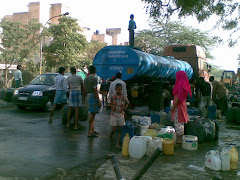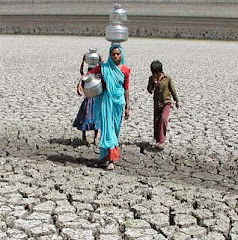Yet another fund has decided to tap the growing water industry in India. India-centric Prithvi Sustainability Innovation and Technology Fund, with a proposed corpus of $150 million, has decided to make investments in the Indian cleantech industry, including the growing water industry.
The fund is looking to make investments in companies in India that provide solutions to water, air and soil contamination. And, it will be looking at emerging areas such as biofuels, air pollution management, soil conservation and organic farming, renewable energy sectors like solar power and wind, solid waste management, biomass combustion, co-generation systems and recycling technology.
Phew! That's just about as much cleantech you can have on your plate.
Prithvi hopes to achieve first close of the fund by January 2010 at $100 million and a final close in March. (I hope to be around to share its next step here).
The fund is currently tapping overseas investors including institutions, high net worth individuals and hedge funds in the US and UK. It also remains in talks with investee companies and will make investments after the first close.
Prithvi hopes to invest in companies engaged in various sectors of the water industry and is particularly eyeing projects in the water contamination, rainwater harvesting and wastewater treatment industry.
The proposed investment by Prithvi in the water sector in India is an indication of the growing interest of venture capitalists in the technology solutions being provided by some Indian companies in the sector. With the growing scarcity expected to create additional demand for water in the country, several private equity funds have already evinced interest in picking up stakes in companies engaged in the water sector.
The $150-million fund will have an investment range of $5 million to $15 million (Rs 23-Rs 70 crore) each in order to help ventures across a range of clean and green technology segments.
Monday, October 26, 2009
Saturday, October 24, 2009
Merck shows the way, brings down water usage
As water supplies across the world dwindle in the wake of climate change and population growth, some companies with a global presence are undertaking serious reduction in water usage. Most of these companies have been making these efforts as part of the overall plan to become more sustainable and minimize business impact on the environment.
Global pharma major Merck announced earlier this month that it has achieved and exceeded its corporate goal to pare water use by 15 per cent between 2004 and 2008. It thus joins a growing list of corporates, including Wal-Mart, Kraft Foods and Whole Foods Market, that are cutting down on water usage in their production systems.
Merck said its strategy for improving water use efficiency included reducing overall demand for water, controlling water discharges and understanding the water-related challenges in regions where it operates.
Merck has achieved significant savings in water use. During 2008, its facilities recycled or reused 1.8 billion gallons of water, reducing its water use by 15 per cent during the previous five years from 2004.
In 2008, the company used 6.1 billion gallons of water less than in 2004, which translated into a 52 per cent reduction. The closure and sale of two water intensive facilities accounted for 59 per cent of its total reduction. Water use reductions at the remainder of its facilities, including new sites that have been added, were 21.4 per cent.
According to the company, it is engaged in numerous initiatives worldwide to reduce water use. Although it has achieved the water use reduction goal, the company said it continues to place high priority on optimizing use of water.
Merck has assigned a water manager at each of its major site who is responsible for identifying water use reduction opportunities, preparing a facility water "balance" to help prioritize the implementation of best practices and conducting water audits to identify leaks and opportunities to reduce water use.
During this year, the company said it will continue its efforts to map water use at its facilities and begin to create profiles of water availability and risks at facilities around the world. The company intends to use that information to identify water use improvements and opportunities that optimize environmental benefit and business value.
It is time that other leading companies too emulate Merck and make efforts to bring down the usage of water, and energy through adoption of efficient methods of production. The need of the hour is to reduce the water footprint and be more water-efficient.
Global pharma major Merck announced earlier this month that it has achieved and exceeded its corporate goal to pare water use by 15 per cent between 2004 and 2008. It thus joins a growing list of corporates, including Wal-Mart, Kraft Foods and Whole Foods Market, that are cutting down on water usage in their production systems.
Merck said its strategy for improving water use efficiency included reducing overall demand for water, controlling water discharges and understanding the water-related challenges in regions where it operates.
Merck has achieved significant savings in water use. During 2008, its facilities recycled or reused 1.8 billion gallons of water, reducing its water use by 15 per cent during the previous five years from 2004.
In 2008, the company used 6.1 billion gallons of water less than in 2004, which translated into a 52 per cent reduction. The closure and sale of two water intensive facilities accounted for 59 per cent of its total reduction. Water use reductions at the remainder of its facilities, including new sites that have been added, were 21.4 per cent.
According to the company, it is engaged in numerous initiatives worldwide to reduce water use. Although it has achieved the water use reduction goal, the company said it continues to place high priority on optimizing use of water.
Merck has assigned a water manager at each of its major site who is responsible for identifying water use reduction opportunities, preparing a facility water "balance" to help prioritize the implementation of best practices and conducting water audits to identify leaks and opportunities to reduce water use.
During this year, the company said it will continue its efforts to map water use at its facilities and begin to create profiles of water availability and risks at facilities around the world. The company intends to use that information to identify water use improvements and opportunities that optimize environmental benefit and business value.
It is time that other leading companies too emulate Merck and make efforts to bring down the usage of water, and energy through adoption of efficient methods of production. The need of the hour is to reduce the water footprint and be more water-efficient.
Labels:
water efficiency,
water footprint,
water manager,
water usage
Saturday, October 10, 2009
Look beyond innovations to tackle water shortages
Global water issues are becoming complex and experts now feel that tackling them would require some out-of-box thinking. Innovations are not enough where water scarcity is concerned and an effective solution to the water problem will involve a business model, creative packaging and a reasonable price, former technology officer of General Electric Water and Process Technologies Ramesh Rengarajan said.
Rengarajan said the requirement was to find solutions that married water sustainability with efficiency. He proposed treatment and reuse of water through a decentralized power system as one solution for water scarcity that may minimize environmental impacts. His comments came during an interactive session at the Massachusetts Institute of Technology in late August.
The former GE official said he saw the treatment and reuse of water as a solution for the growing water shortages across regions. While this "toilet-to-tap" method makes some people uneasy, it has been widely used with no harmful effects.
He said he envisioned a device people could plug in and use on-site, like an air conditioner, to disinfect water. The solution would have to be cost-effective in order to work. While people are willing to pay for gas and oil, they are reluctant to do so for water, he added.
According to Rengarajan, finding a solution to global water scarcity was 'not a challenge, but an opportunity'. A solution would benefit the environment and potentially create a multibillion-dollar business, he added.
Against a backdrop of growing water scarcity around the world, any business that promises a solution would indeed be worthwhile. The last several years have seen advancement in technology solutions including new and efficient ways to desaline, reuse and treat water. Now, water is even being made from mist, or out of air. Going ahead, all of these would become still more efficient and effective, and hopefully, some new solutions would arrive.
Rengarajan said the requirement was to find solutions that married water sustainability with efficiency. He proposed treatment and reuse of water through a decentralized power system as one solution for water scarcity that may minimize environmental impacts. His comments came during an interactive session at the Massachusetts Institute of Technology in late August.
The former GE official said he saw the treatment and reuse of water as a solution for the growing water shortages across regions. While this "toilet-to-tap" method makes some people uneasy, it has been widely used with no harmful effects.
He said he envisioned a device people could plug in and use on-site, like an air conditioner, to disinfect water. The solution would have to be cost-effective in order to work. While people are willing to pay for gas and oil, they are reluctant to do so for water, he added.
According to Rengarajan, finding a solution to global water scarcity was 'not a challenge, but an opportunity'. A solution would benefit the environment and potentially create a multibillion-dollar business, he added.
Against a backdrop of growing water scarcity around the world, any business that promises a solution would indeed be worthwhile. The last several years have seen advancement in technology solutions including new and efficient ways to desaline, reuse and treat water. Now, water is even being made from mist, or out of air. Going ahead, all of these would become still more efficient and effective, and hopefully, some new solutions would arrive.
Labels:
water reuse,
water scarcity,
water treatment
Subscribe to:
Posts (Atom)

.jpg)


